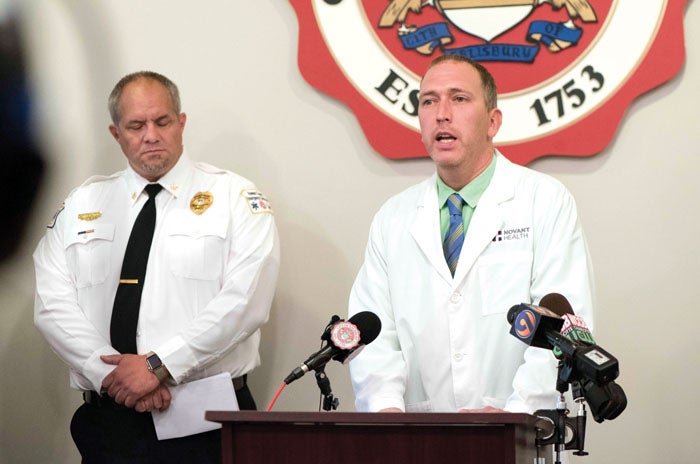Editorial: Work remains in fight against opioid epidemic
Published 5:22 pm Monday, December 31, 2018

- Dr. John Bream, Novant Health Rowan Medical Medical Center's director of the Emergency Department, makes comments in 2017 about the opioid problem. Law enforcement, EMS, Novant Health and Daymark Recovery held a joint press conference to bring to light the large spike in opioid overdoses in Rowan and other counties. Jon C. Lakey/Salisbury Post
While the opioid epidemic is far from subsiding, Rowan County is the subject of a trend in the right direction.
In 2018, Rowan saw a decline in opioid overdose cases as compared to the year prior. Reporter Shavonne Walker wrote in the Sunday Salisbury Post (“Rowan sees a decline in opioid overdose cases”) that the number of opioid overdoses reported to the emergency room declined by almost 60 percent from 2018 to 2017. We’re now no longer ranked in the top 10 North Carolina counties for opioid overdoses.
“Generally, we have seen a pretty significant decrease in opioid overdoses,” said Greg Bream, medical director of Novant Health Rowan Medical Center’s emergency department.
Bream said the public is more aware of the dangers of opioids and that he hopes an increase in awareness is the reason for a decline in overdoses.
Sheriff’s office Chief Deputy David Ramsey says the decrease may be a result of the deployment of Narcan, an overdose reversal drug. A number of overdoses are not reported. Narcan may be used by acquaintances in the case of an overdose, Ramsey said. So, those aren’t accounted for in official statistics.
Whatever the reason for the decrease, public health officials must continue working to raise awareness about the dangers of opioid use. One child left without a parent because his or her mom or dad died of an overdose is one too many. Parents also shouldn’t be left without a child because of opioid use, whether it’s a pill or a dose of black tar heroin.
For perspective, 9 percent of the overdoses the sheriff’s office responded to in 2018 resulted in death.
The trouble is extending the conversation — that there are resources for those looking to quit and that stopping is better than the possible alternative, death — to those who have not already been reached and the addicts who continue to use.
No one solution will solve the opioid epidemic, but by continuing the good work already started by law enforcement and health professionals we can continue making progress toward ending the opioid epidemic in our community.


